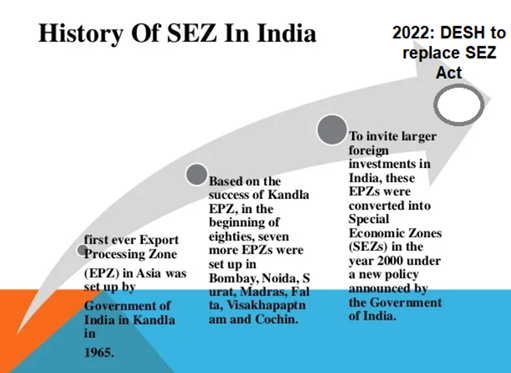DEVELOPMENT OF ENTERPRISE AND SERVICE HUBS (DESH)

Disclaimer: Copyright infringement not intended.
Context
- In the Union Budget this year, the government proposed to replace the existing law governing Special Economic Zones (SEZs) with a new legislation to enable states to become partners in 'Development of Enterprise and Service Hubs' (DESH).
- Now, the commerce ministry is proposing a host of direct and indirect incentives such as deferral of import duties and exemption from export taxes to revamp Special Economic Zones through a new legislation.
About Special Economic Zone
- A special economic zone is a region in the country that is subject to unique economic rules and regulations that differ from other regions of the same country.
- Traditionally the biggest deterrents to foreign investment in India have been high tariffs and taxes, red tape and strict labour laws. The SEZ regulations were made conducive to foreign direct investment (FDI).
- These areas have developed infrastructure, liberal economic policy, and concession tax rates for the firms.
- SEZ Policy was introduced to India in 2000. Prior to SEZ introduction, India relied on export processing zones (EPZ) which failed to make an impact on foreign investors.
- To instill confidence in investors and highlight the Government's commitment to a stable SEZ policy regime. In May 2005, parliament passed The Special Economic Zones Act, 2005.
- The key objectives of the SEZ Act 2005 include:
- Creation of additional economic activities.
- Promoting exports of goods and services.
- Promoting investment from domestic and foreign sources.
- Creation of employment opportunities.
- Development of infrastructure facilities.
SEZ can be set up by
- Public/State government or its agencies
- Private/Joint sector
- Foreign agency
Types of SEZ
- According the SEZ Act there are four types of SEZs in India, classified according to their size:
- Multi-sector (1,000+ hectares).
- Sector-specific (100+ hectares).
- Free Trade & Warehousing Zone (FTWZ) (40+ hectares).
- Tech, handicraft, non-conventional energy, gems & jewellery (10+ hectares)
- Presently, 351 SEZs are notified, out of which 232 SEZs are operational.
What were the shortcomings of the SEZ Act?
- According to the World Trade Organization’s dispute settlement panel, India’s export-related schemes, including the SEZ Scheme, were inconsistent with WTO rules since they directly linked tax benefits to exports.
- The SEZ Act was implemented in 2006 in a bid to create export hubs and boost manufacturing in the country.
- However, these zones started losing their sheen after the imposition of a minimum alternate tax and the introduction of a sunset clause for the removal of tax incentives.
- The dispute settlement panel of Geneva-based WTO in its report of, 2019, ruled that India’s export-related schemes (including SEZ Scheme) were in the nature of prohibited subsidies under the Agreement on Subsidies and Countervailing Measures and were inconsistent with WTO norms. India has appealed against this order.
What is Development of Enterprise and Service Hubs (DESH)?
- It will overhaul the existing Special Economic Zone law of 2005, aiming to revive interest in SEZs and develop more inclusive economic hubs.
- Unlike in the SEZ ecosystem, the government has proposed to create developmental hubs, whose focus is not limited to exports, but also to cater to the domestic markets. The customs duty would only be paid on the inputs used and not on the expensive final goods. The Bill also seeks to integrate existing industrial estates such as textiles and food parks by converting them into developmental hubs.
- The new law will allow units to produce both for domestic and international markets. Evaluation based on net foreign exchange and direct tax incentives have been done away with in order to comply with WTO rules.
- According to the DESH Bill, net positive growth criteria will be used to judge performance.
- SEZs will be revamped and renamed Development Hubs. They will be free from several laws that currently restrict them. These hubs will facilitate both export-oriented and domestic investment.
- The DESH Bill classifies two types of developmental hubs -- Enterprise and services hubs. While the enterprise hubs will have land-based area requirements and be allowed for both manufacturing and services activities, services hubs will have built-up area requirements and be allowed for only services-related activities. These hubs, which will come up under the regional boards of states, could be created by Centre or states or jointly by both or by any goods and services provider.
- One of the key aspects of the new DESH Bill is also to promote the expansion of the gambit of service sector units. Currently, only specified services such as IT, ITeS are allowed in special economic zones.
- The Bill also proposes to offer tax benefits and other sops. The draft bill proposes to freeze the corporation tax at concessional 15% for greenfield and brownfield units in the developmental hubs.
- The government may impose an equalisation levy on goods or services supplied to the domestic market to bring taxes at par with those provided by units outside.

Significance of DESH
- India needs large industrial manufacturing zones, which have world-class infrastructure so that those places become manufacturing hubs of the future.
- This new Act will lead to the revival of activities in SEZ areas. They will be manufacturing for both international and domestic markets.
- The new SEZ Act will be WTO-compliant and will have a single window (clearance system). High-class infrastructure will be there and more benefits will be there




1.png)
